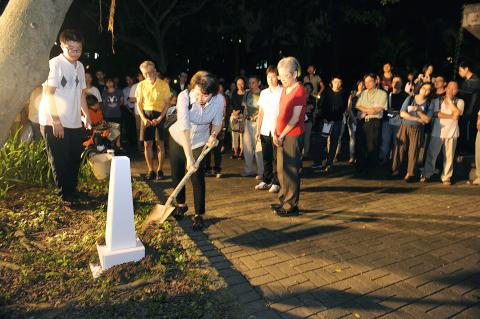More than 100 people gathered yesterday evening at National Taiwan University (NTU) in memory of former Carnegie Mellon University (CMU) assistant professor Chen Wen-cheng (陳文成), whose death 30 years ago remains a mystery to this day.
Chen, a graduate of NTU’s Department of Mathematics, went to study in the US and later became an assistant professor at CMU’s Department of Statistics.
He was called by the Taiwan Garrison Command — a military state security agency during the Martial Law era — for interrogation on July 2, 1981, when he returned to Taiwan to visit his family, because of his support for the pro-democracy movement.

Photo: George Tsormg,Taipei Times
On the morning of July 3, 1981, Chen’s body was discovered next to a library on the NTU campus and it was unclear whether his body was deliberately placed there to appear as though he had committed suicide or fallen off the building by accident.
The Garrison Command said they released Chen after the interrogation and that they had nothing to do with his death.
Thirty years later, what really happened that night remains a mystery.
“I am really thankful that so many of you students came out tonight to remember my brother and what happened 30 years ago,” Chen’s elder sister, Chen Pao-yueh (陳寶月), told the gathering of NTU students, friends and family members at the site where Chen’s body was found.
A documentary on Chen was also shown at the service.
“Some people may think what happened to my brother has nothing to do with them. Well, if no one pays attention to such things, one day, what happened to my brother may happen to you too, and by that time, you would regret that you didn’t care enough earlier,” she said.
She criticized the Chinese Nationalist Party (KMT) party for “not admitting to the bad things they have done,” and said that, at the age of 60, the only thing she cares about now is discovering the truth about Chen Wen-cheng’s death.
“[Chen Wen-cheng’s death] is something big that has happened on our campus. He was an NTU graduate as well, but the school never paid much attention to it and most of students don’t know about it, and we think this is not right,” said Lin Hsin-yeh (林欣曄), president of the NTU Graduate Student Association. “This is why we’ve organized this event to commemorate the 30th anniversary of Chen Wen-cheng’s death.”
She said the association, as well the undergraduate student organization NTU Student Association, would not only like more of their classmates to know about Chen Wen-cheng’s story, but also called on the school to erect an official memorial for him on the site where his body was discovered, and to record Chen Wen-cheng’s story into the school’s history.
The students made their own miniature memorial and placed it on the site where Chen Wen-cheng’s body was discovered, hoping that there would be an official one next year.
In addition to the on-campus memorial event, the Chen Wen-cheng Memorial Foundation will organize a concert in his memory tomorrow at 7:30pm at the Civil Service Development Institute in Taipei.

A Ministry of Foreign Affairs official yesterday said that a delegation that visited China for an APEC meeting did not receive any kind of treatment that downgraded Taiwan’s sovereignty. Department of International Organizations Director-General Jonathan Sun (孫儉元) said that he and a group of ministry officials visited Shenzhen, China, to attend the APEC Informal Senior Officials’ Meeting last month. The trip went “smoothly and safely” for all Taiwanese delegates, as the Chinese side arranged the trip in accordance with long-standing practices, Sun said at the ministry’s weekly briefing. The Taiwanese group did not encounter any political suppression, he said. Sun made the remarks when

The Taiwanese passport ranked 33rd in a global listing of passports by convenience this month, rising three places from last month’s ranking, but matching its position in January last year. The Henley Passport Index, an international ranking of passports by the number of designations its holder can travel to without a visa, showed that the Taiwan passport enables holders to travel to 139 countries and territories without a visa. Singapore’s passport was ranked the most powerful with visa-free access to 192 destinations out of 227, according to the index published on Tuesday by UK-based migration investment consultancy firm Henley and Partners. Japan’s and

BROAD AGREEMENT: The two are nearing a trade deal to reduce Taiwan’s tariff to 15% and a commitment for TSMC to build five more fabs, a ‘New York Times’ report said Taiwan and the US have reached a broad consensus on a trade deal, the Executive Yuan’s Office of Trade Negotiations said yesterday, after a report said that Washington is set to reduce Taiwan’s tariff rate to 15 percent. The New York Times on Monday reported that the two nations are nearing a trade deal to reduce Taiwan’s tariff rate to 15 percent and commit Taiwan Semiconductor Manufacturing Co (TSMC, 台積電) to building at least five more facilities in the US. “The agreement, which has been under negotiation for months, is being legally scrubbed and could be announced this month,” the paper said,

Japan and the Philippines yesterday signed a defense pact that would allow the tax-free provision of ammunition, fuel, food and other necessities when their forces stage joint training to boost deterrence against China’s growing aggression in the region and to bolster their preparation for natural disasters. Japan has faced increasing political, trade and security tensions with China, which was angered by Japanese Prime Minister Sanae Takaichi’s remark that a Chinese attack on Taiwan would be a survival-threatening situation for Japan, triggering a military response. Japan and the Philippines have also had separate territorial conflicts with Beijing in the East and South China